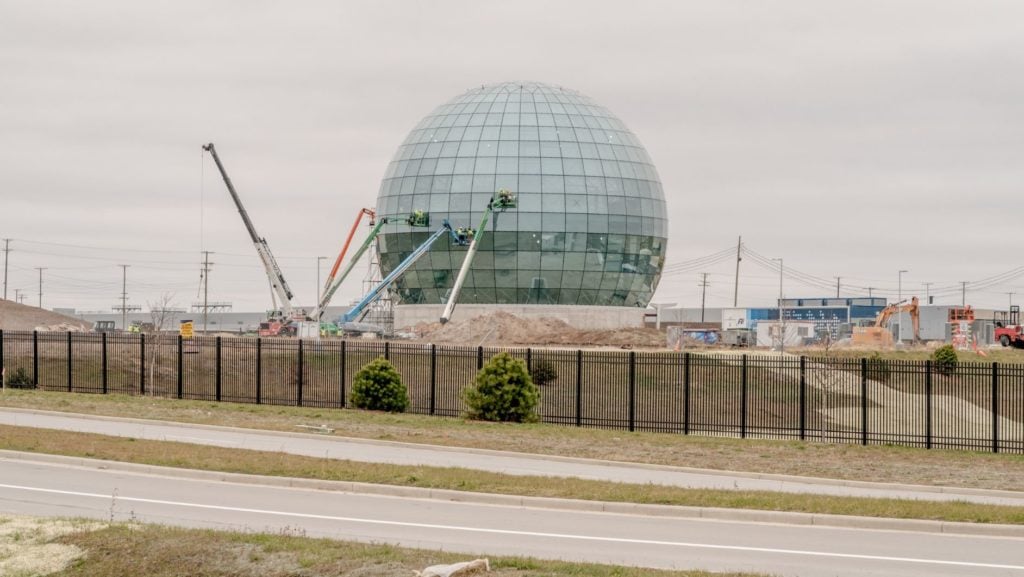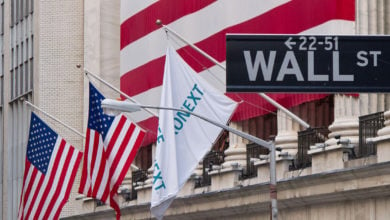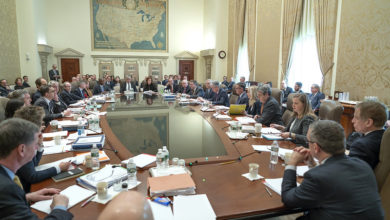Heralding the endeavor as the “eighth wonder of the world,” United States President Donald Trump praised the Foxconn Technology Group’s promise to build a 20 million-square-foot manufacturing complex and supply 13,000 new jobs. Appearing together, Pres. Donald Trump and Foxconn founder Terry Gou broke the ground for the highly touted Foxconn industrial campus in June 2018. Their celebration proved not only premature but cynical as well, as their promises to southeastern Wisconsin have yet to materialize. After two years of little to no progress, it seems apparent that the only thing Foxconn will supply is empty promises.
Numerous mainstream news outlets conducted extensive reporting over the last three years on the illusory nature of the Foxconn deal in Wisconsin. The most recent example being in the Verge this past October. However, each account, no matter how detailed, views the Foxconn debacle as an aberration rather than a natural symptom of the capitalist economic order.
Underneath the lofty claims, photo opportunities and public relations used by Trump, Gou and Wisconsin Republicans is a hollow reality, one that indicates an inherent hollowness in the capitalist system.
Foxconn boasts of ambitious plans for Wisconsin
Initially announced in July 2017, the Taiwan-based LCD-screen manufacturer, Foxconn, promised to invest $10 billion in Wisconsin. Foxconn announced a state-of-the-art LCD manufacturing plant in the village of Mt. Pleasant. The company also promised 13,000 jobs as early as 2022. The office of then-Republican Governor, Scott Walker predicted that 22,000 jobs could indirectly be created by other businesses moving near the Foxconn facility.
Foxconn claimed it would build a massive Generation 10.5 facility to produce LCD screens and provide high-paying jobs to 8,500 workers. However, construction for the Gen 10.5 plant never happened and Foxconn went on to temper their ambitions and propose a Gen 6 facility that would employ only 5,200 workers. Currently, even the company’s diminished proposal has yet to come to fruition.
Foxconn’s illusions incentivized at the cost of the working class
In a bid to entice the Taiwan-based manufacturer to Wisconsin in November 2017, Governor Walker pledged $3 billion in tax subsidies and $150 million in sales-taxes exemptions contingent on Foxconn hitting certain employment and capital investment thresholds.

According to a report from the Wisconsin Legislative Fiscal Bureau, Walker’s deal would see Foxconn profit for decades while Wisconsin would not break even from the deal until the year 2043. This projection revealed that Foxconn would reap major profits while costing working-class Wisconsinites through higher taxes and diminished state-funded services.
The excessive state spending on the Foxconn deal has not escaped the criticism of working Wisconsinites as they realize they will be the ones footing the bill. Speaking to Liberation News, a local public servant described the deal as “a complete failure.” He believed that “the measurables have not occurred or are not occurring with the number of jobs being the primary,” and that “the investment by the state [would] not be recovered.”
Even without granting Foxconn the tax subsidies, working-class Wisconsinites, especially those of Racine County, still paid $400 million for infrastructure projects that benefit the multinational manufacturer. One such project is the widening of the I-94 highway in Racine and Kenosha counties for traffic that would have been drawn to the facility.
Eminent domain used to snatch land for Foxconn
To clear space for Foxconn’s prospective developments, Mt. Pleasant’s Village Board of Trustees designated 2,800 acres of land as “blighted” by a 6-1 vote. Before their vote, the Village Board was already buying out homeowners and threatening eminent domain for those who were slow to sell. The “blighted” designation allowed for the more expansive use of eminent domain against hold-outs. The Village Board utilized one part of a Wisconsin statute that broadly defined blighted as any property that “substantially impairs or arrests the sound growth of the community.”
Though the Village Board worked in earnest to accommodate Foxconn, regular, working-class families received no such treatment. Mt. Pleasant officials took it a step further when they threw a family out of their home and put them in a dilapidated house in order to cater to Foxconn. A displaced family consisting of a father, who uses a wheelchair, and his sons, received temporary housing that had no air conditioning, no working furnace, no septic tank, and was not wheelchair-accessible.
Lake Michigan water laws shirked to serve Foxconn
In April 2018, the Wisconsin Department of Natural Resources (WDNR) approved the city of Racine’s request to daily divert 7 million gallons of water from Lake Michigan for the Foxconn-owned land in the village of Mt. Pleasant. This was a controversial decision by the WDNR as it circumvents the agreement commonly called the Great Lakes Compact. The Compact is an interstate agreement that governs the access to and usage of the Great Lakes Water Basin’s water supply.
For the most part, the Great Lakes Compact bans diversions of Great Lakes’ water with exceptions for “straddling communities” and “straddling counties.” Applications for diversions for straddling communities and counties are strictly scrutinized, as evidenced by Waukesha County’s request to divert Lake Michigan water from the city of Milwaukee to replace its depleted and radium-contaminated well water. However, the WDNR argues that Racine’s diversion application simply seeks to expand its service area. The WDNR approved the request of Racine, an in-basin city, to divert water to the prospective Foxconn facility based on the facts (determined by the WDNR ) that the Racine Water Utility already delivers much of the village’s water, the village is a “straddling community” and most of the village was within the basin despite Foxconn’s facility being outside of it. A year later, an administrative law judge upheld the approval after a legal challenge by environmental groups.
The non-profit environmental law center Midwest Environmental Advocates, and others, unsuccessfully argued that the Great Lakes Compact dictates that diversions must be only used for “public water supply purposes.” The initial approval and its upholding set a dangerous precedent that gives big industrial users like Foxconn preference to Lake Michigan and other freshwater bodies in the Great Lakes Basin. The ruling favors corporate profits over the water needs of the working people.
Privatization of the Great Lakes’ freshwater supply is a prominent issue amidst an approaching environmental crisis. Profit-seeking companies’ exploitation of the Great Lake waters will lead to accelerated degradation through increased pollution and drainage. As corporate use of the Great Lakes expands it will not only inhibit recreational activities for working people but also access to life-necessary freshwater. Privatization for profit will also cause ecological disasters for other species dependent on the Great Lakes.
Wisconsin democrats offer little resistance
The original subsidy package passed the Republican-controlled Wisconsin Assembly 64-31 in 2017 with three Democrats joining the Republicans to pass it. The majority of state Democrats criticized the Foxconn subsidies, pointing-out the outrageous largesse that it offered the company. However, beyond verbal criticisms, they did little else to protect Wisconsin’s workers from exploitation by Foxconn. Democrats proved weak-willed even after Foxconn-deal critic, Democrat Tony Evers beat Walker in the 2018 gubernatorial race and took office.

Notwithstanding his criticism of the deal as a candidate, Evers soon warmed up to Foxconn. In a meeting in May 2019 with Foxconn’s founder and chairman Gou, Evers stated that he was “not doubting [Foxconn’s] word” and that he was “never not supportive of [the Foxconn deal]. Near the end of 2019, Evers said that Foxconn’s success was in the best interest of the state.
Although Evers’ attempts to renegotiate the terms of the Foxconn deal were severely thwarted by the Republicans, the governor remains all too willing to allow Foxconn’s charade to continue despite its harm to the working class. Evers’ state Democratic compatriots have followed his example. As of October, the Wisconsin Economic Development Corporation (WEDC) has denied Foxconn’s eligibility for the subsidies due to them not meeting employment and investment thresholds and for refusing to renegotiate the deal. Although apparent that Foxconn has (and had) no intention of following through on its promises, in a letter to the WEDC Vice-Chairman, WEDC secretary Missy Hughes, said, “I can see that there are many avenues for Foxconn’s future success in Wisconsin, and I look forward to partnering with you in that success.”
A Democratic assemblyman at the time of the 2017 vote on the Foxconn deal, current Racine Mayor Cory Mason voted in favor of the deal. Mason re-iterated that to him Foxconn represented renewed “economic security” for Racine, which has been ravaged by deindustrialization. In meetings in 2019, Foxconn entranced Mason with its “Smart City” proposal that contained a slew of shiny high-tech (and dystopic) initiatives like autonomous vehicles loaded with cameras to patrol the streets for crime and self-driving shuttles for workers. The proposal proved to be a lie when Foxconn postponed the project indefinitely, leaving the city with nothing but a broken promise.
Although Democrats seemed to bow to political pressure applied to them by Republicans and Foxconn, their words and actions indicated a different proposition. Instead, from Evers on down, Democrats merely differed with the Republicans on the deal’s technicalities. As they have shown, the Democrats want to court Foxconn too, they just want to do it with more decorum. Their opposition is more form than function, their fight is to give Foxconn’s exploitation a nicer face.
From the start, the Wisconsin Foxconn deal in all of its delusional grandeur has been nothing but hot air blown from the mouths of a gallery of capitalist rogues like Donald Trump, Scott Walker, and Terry Gou. Each man used the Foxconn deal as a public relations gambit to gain and maintain working Wisconsinites’ support to benefit themselves, Foxconn, and the capitalist system.






